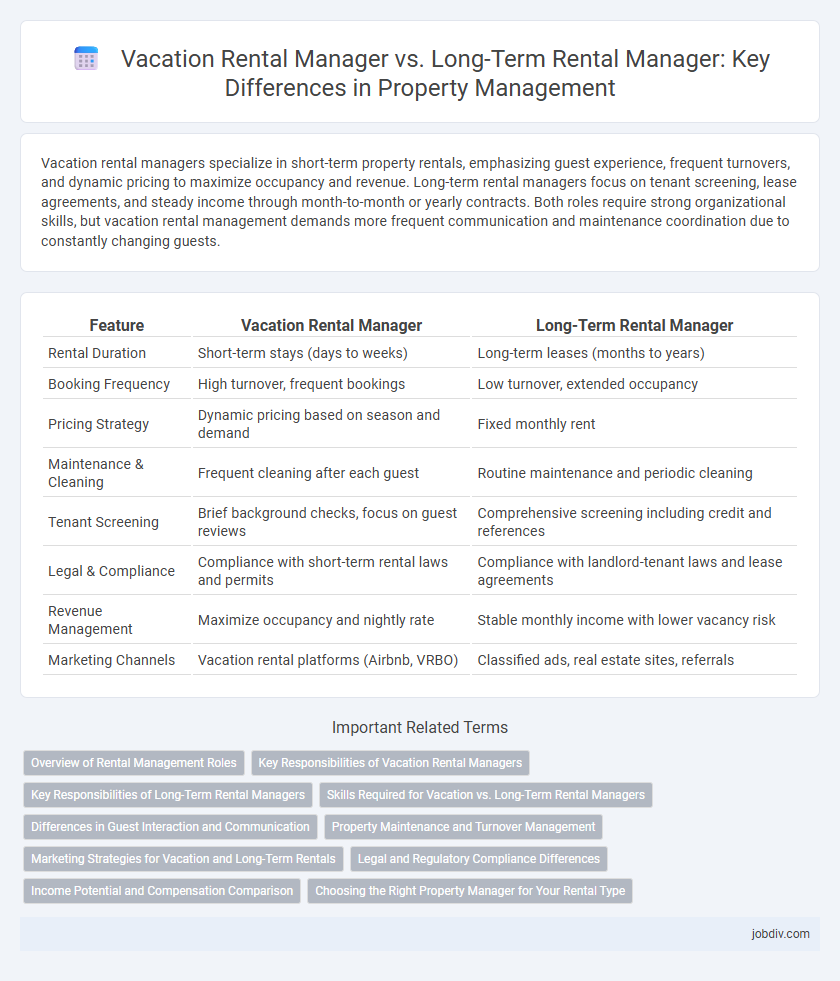Vacation rental managers specialize in short-term property rentals, emphasizing guest experience, frequent turnovers, and dynamic pricing to maximize occupancy and revenue. Long-term rental managers focus on tenant screening, lease agreements, and steady income through month-to-month or yearly contracts. Both roles require strong organizational skills, but vacation rental management demands more frequent communication and maintenance coordination due to constantly changing guests.
Table of Comparison
| Feature | Vacation Rental Manager | Long-Term Rental Manager |
|---|---|---|
| Rental Duration | Short-term stays (days to weeks) | Long-term leases (months to years) |
| Booking Frequency | High turnover, frequent bookings | Low turnover, extended occupancy |
| Pricing Strategy | Dynamic pricing based on season and demand | Fixed monthly rent |
| Maintenance & Cleaning | Frequent cleaning after each guest | Routine maintenance and periodic cleaning |
| Tenant Screening | Brief background checks, focus on guest reviews | Comprehensive screening including credit and references |
| Legal & Compliance | Compliance with short-term rental laws and permits | Compliance with landlord-tenant laws and lease agreements |
| Revenue Management | Maximize occupancy and nightly rate | Stable monthly income with lower vacancy risk |
| Marketing Channels | Vacation rental platforms (Airbnb, VRBO) | Classified ads, real estate sites, referrals |
Overview of Rental Management Roles
Vacation rental managers specialize in short-term property rentals, focusing on marketing, guest communication, and rapid turnover to maximize occupancy and revenue. Long-term rental managers oversee extended leases, tenant screening, rent collection, and property maintenance to ensure steady income and tenant retention. Both roles require expertise in property regulations and financial management, but differ in operational pace and tenant interaction.
Key Responsibilities of Vacation Rental Managers
Vacation rental managers oversee short-term property bookings, guest communications, and maintenance coordination to ensure a seamless guest experience. They manage dynamic pricing strategies, marketing on platforms like Airbnb and Vrbo, and enforce strict cleaning protocols to maintain high occupancy rates. Their role emphasizes quick turnaround times between stays, guest satisfaction, and compliance with local vacation rental regulations.
Key Responsibilities of Long-Term Rental Managers
Long-term rental managers oversee tenant screening, lease agreement enforcement, and routine property maintenance to ensure consistent occupancy and income stability. They coordinate rent collection, handle tenant disputes, and ensure compliance with local housing regulations to minimize legal risks. Their role emphasizes building long-term tenant relationships and managing property budgets to optimize investment returns over extended rental periods.
Skills Required for Vacation vs. Long-Term Rental Managers
Vacation rental managers require strong skills in short-term guest relations, dynamic pricing strategies, and rapid property turnover management, emphasizing hospitality and marketing expertise. Long-term rental managers prioritize skills in tenant screening, lease negotiation, and property maintenance coordination to ensure sustained occupancy and compliance with rental laws. Both roles demand effective communication and conflict resolution abilities tailored to their rental duration and tenant interactions.
Differences in Guest Interaction and Communication
Vacation rental managers engage frequently with guests for short stays, providing rapid responses, personalized recommendations, and flexible communication channels to enhance guest experience. Long-term rental managers maintain periodic, scheduled communication focused on lease terms, maintenance issues, and tenant retention, fostering a stable landlord-tenant relationship. The intensity and nature of guest interaction differ significantly, with vacation rental management emphasizing hospitality and immediate guest satisfaction while long-term management prioritizes consistency and ongoing tenant support.
Property Maintenance and Turnover Management
Vacation rental managers excel in rapid property maintenance and turnover management, ensuring frequent cleanings, repairs, and inspections between short guest stays to maintain high occupancy rates. Long-term rental managers focus on sustained property upkeep, scheduling less frequent but thorough maintenance to preserve asset value over extended lease periods. Effective turnover strategies in vacation rentals involve quick turnaround and staging, while long-term rentals prioritize tenant-requested repairs and seasonal property checks.
Marketing Strategies for Vacation and Long-Term Rentals
Vacation rental managers utilize dynamic pricing models, targeted social media campaigns, and listing optimization on platforms like Airbnb and VRBO to attract short-term travelers seeking unique stays. Long-term rental managers emphasize neighborhood engagement, tenant screening, and consistent branding through local classifieds, property management websites, and relocation services to secure longer leases. Tailoring marketing approaches to the rental duration enhances tenant acquisition and occupancy rates for both vacation and long-term properties.
Legal and Regulatory Compliance Differences
Vacation rental managers navigate complex short-term lodging regulations, including transient occupancy taxes, licensing, and strict safety standards, which vary significantly from one jurisdiction to another. Long-term rental managers primarily handle tenant-landlord laws, lease agreements, eviction procedures, and habitability requirements that are typically governed by state or local housing authorities. Understanding these distinct legal frameworks is crucial for compliance, risk mitigation, and effective property management in each rental segment.
Income Potential and Compensation Comparison
Vacation rental managers often earn higher income potential due to dynamic pricing models and frequent turnover, maximizing short-term rental rates. Long-term rental managers receive steadier, more predictable compensation driven by monthly lease agreements but typically lower monthly revenue per unit. The compensation for vacation rental managers frequently includes performance-based bonuses tied to occupancy rates, while long-term rental managers benefit from consistent commissions based on lease duration.
Choosing the Right Property Manager for Your Rental Type
Vacation rental managers specialize in short-term guest turnover, dynamic pricing, and marketing on multiple platforms, ensuring high occupancy and guest satisfaction. Long-term rental managers focus on tenant screening, lease agreements, and consistent monthly rent collection, providing stability and reduced vacancy rates. Selecting the right property manager depends on your rental strategy, property location, and desired income consistency.
Vacation Rental Manager vs Long-Term Rental Manager Infographic

 jobdiv.com
jobdiv.com